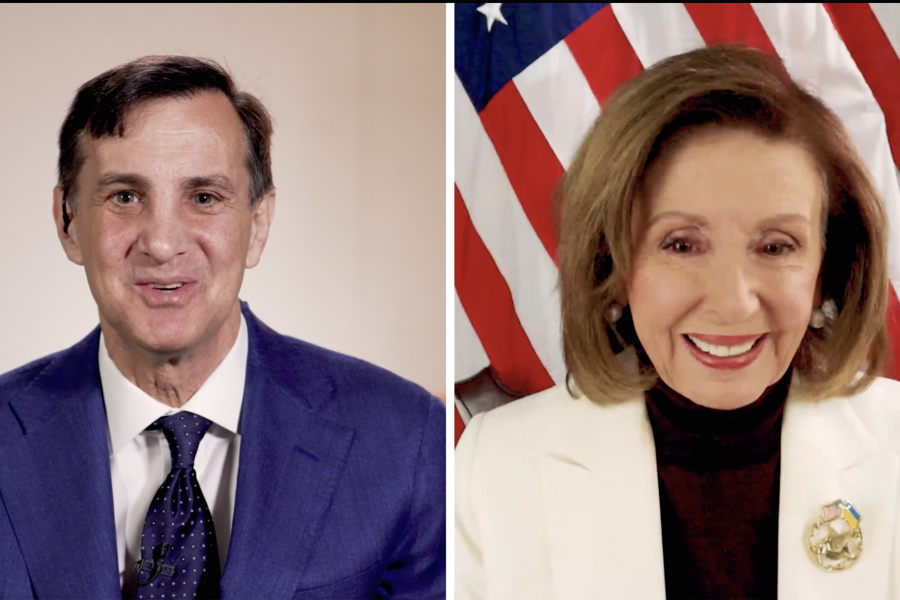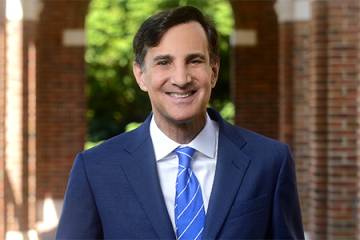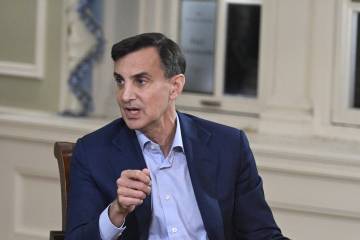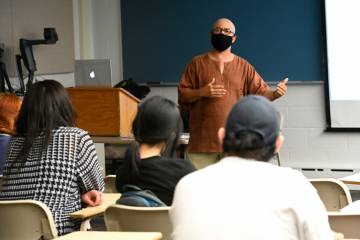U.S. Rep. Elijah Cummings was an avid advocate for children and their civic education, famously saying, "Children are our messengers to a future we will never see." His longtime friend and fellow member of Congress Nancy Pelosi, the 52nd speaker of the House of Representatives, recalled that quote from Cummings during a virtual talk with Johns Hopkins University President Ron Daniels on Tuesday.
"We have to prepare children and young people for the future, but also prepare a future worthy of the aspirations of our children and our young people," Pelosi said.
The talk, hosted by the SNF Agora Institute at Johns Hopkins, was held as part of the second annual Elijah E. Cummings Democracy and Freedom Festival, created by Maya Rockeymoore Cummings, the late congressman's widow. In his lifetime, Cummings spent 12 terms in the U.S. House of Representatives serving Maryland's 7th Congressional District, which includes Johns Hopkins University's Baltimore campuses. He was a frequent guest and speaker at Johns Hopkins events over the years, receiving an honorary degree in 2015, and was a steadfast supporter of the institution's community efforts.
Pelosi, a native of Baltimore who took summer courses at Johns Hopkins, was awarded the university's honorary degree in 2009. Now in her 34th year of representing California's 12th district, Pelosi joined Daniels for a brief but wide-ranging question-and-answer session that touched on Cummings' legacy and the relationship between political and civic institutions and democracy.
From the outset of the talk, Daniels and Pelosi focused on the role young people play in advocating for social change. Citing the American Revolution, the civil rights movement, and protests against the Vietnam War as examples, Pelosi said, "Our country has been blessed by the activism of young people, by their resistance to the status quo." Young people's activism isn't new or threatening—"it's something to celebrate," Pelosi said.
And yet, she conceded that among today's young people there is a widespread distrust of the democratic institutions that undergird America's political system. She called on those in positions of political power to earn back the public's trust. "We have to show people another path" out of political rancor, Pelosi said.
Johns Hopkins has sought to illuminate an alternate path that emphasizes open discourse and civic participation and engagement. Since 2017, the SNF Agora Institute has sought to restore open and inclusive dialogue as a cornerstone of a healthy global democracy. Last fall, for example, the institute joined the Johns Hopkins Center for Social Concern and Orientation program to organize the university's first-ever Democracy Day, an event that prompted students to consider their rights and responsibilities as citizens. The event included voter registration drives and pop-up seminars by leading Johns Hopkins experts on issues that threaten democracy, such as disinformation, the marginalization of underrepresented communities, and the allure of authoritarianism.
Daniels, too, has long been committed to studying and advocating for democratic ideals. In his 2021 book What Universities Owe Democracy, Daniels—who has taught undergraduate courses on the relationship between universities and democracy and who has made increasing access for talented students from all backgrounds a signature priority of his Hopkins tenure—draws from his nearly three decades of experience as a university leader to conclude that institutions of higher learning are engines for social mobility, civic education, pluralism, and truth.
During yesterday's conversation, he asked Pelosi to share a moment that makes her hopeful for a future where bipartisan political progress is possible. She pointed to the recent passage of the Postal Service Reform Act of 2022, a bill originated by Cummings before his death.
"Why I mention that is because there had been differences of opinion, and yet we came together with a big bipartisan vote," Pelosi said. "Elijah Cummings is the epitome, the personification of what you just asked. He always tried to find common ground. He always was respectful of other points of view, but he was always firm in his values."
She said she is hopeful to find bipartisan support for other legislative priorities Cummings held dear, such as laws to protect voting rights. "We have to recognize the challenges, be respectful of different views, and again, be hopeful to make progress with empathy for all points of view in our society," she said.
Posted in Voices+Opinion, Politics+Society
Tagged snf agora institute











